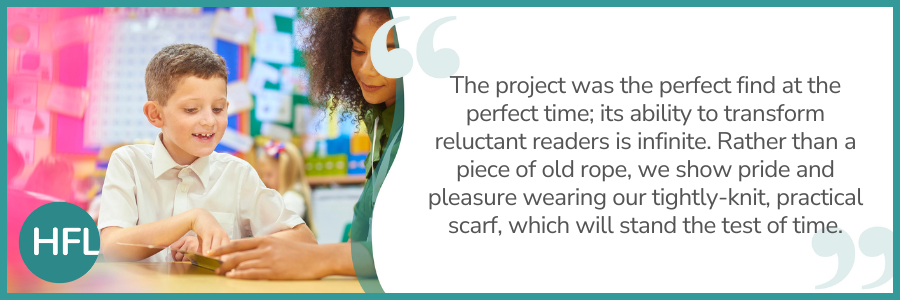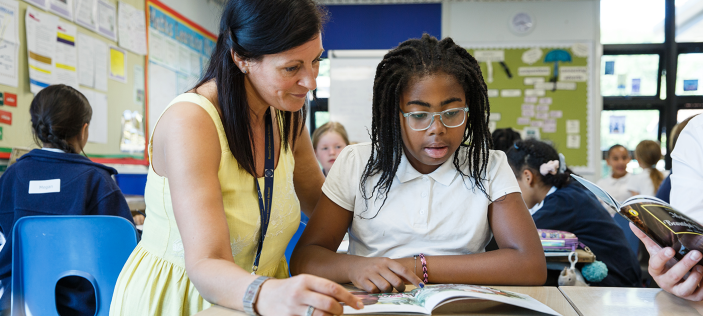
The HFL Reading Fluency Project is currently in its 20th cohort for KS2 pupils and its 15th cohort for our year 2/3 pupils (the KS1 project). The Reading Fluency Project artfully combines a range of evidence-based strategies such as modelled expert prosody; echo reading; text marking; performance reading; repeated reading and modelling comprehension. For many of our participating pupils, this combination of approaches, taught with rigour and frequency, supports them to move on from stilted decoding and into fluent reading. It is when reading with fluency that the text is able to come to life, to impart its meaning upon the reader. Once this virtuous circle is established, then pupils perceive themselves as readers and return to reading again and again. They feel the joy that a reader experiences when a text speaks to them, and the more they practise this skill, the better they get at it. The following blog is written by Hayley Bloss, Leading Practitioner at Kyson Primary School, Suffolk. Hayley shares some of the amazing outcomes achieved by her pupils, following her attendance at HFL’s Reading Fluency Project training.
It had been a tough term: four pupils rolling their eyes at me whenever it was time for their group reading session. They’d had years of seeing themselves as the ‘failing readers’, never quite cracking phonics, struggling to decode, unable to find any enjoyment in this thing called ‘reading’. The strands of their ‘reading rope’ (Scarborough, 2001) were flailing everywhere with no signs of tightening. It had become a millstone round their necks; the thorn in their sides; their confidence squasher. Did I enjoy teaching reading to these children who had come to hate books? I tried; I poured out my soul in every lesson - willing any sign of enjoyment to come – but I continued to find dread in their uninterested faces.
Seeking answers, I did a Google search in Spring 2019: ‘Intervention to get my Year 6s to expected standard in reading.’
Up popped the results…
Tried it... not for us.
Tried it… too expensive.
Tried it… too resource heavy.
A project…? The HFL Reading Fluency Project! It was definitely worth a shot!
I had the training and began. Carefully picking that first text to ignite their interest; the shock on their faces when all I wanted them to do was repeat after me; the calmness; the engagement; the finger-tracking; the performance; the smiles…! It was all so effortless and obtainable. In March 2019, the four pupils were scoring a standardised score of between 82-88. The 8-week project flew by and in the summer term, two of them reached the expected standard in the reading SATs, and the other two scored in the high 90s. But, so much more than that - they enjoyed the reading together; their behaviour improved in reading sessions; their confidence grew and that ‘reading’ thing was no longer a dreaded word!
This project was exciting, easy to access and provided results far exceeding the data.
The project was put in place as a reading intervention from Year 2-6 in Autumn 2020 and the results were outstanding*:
| Year Group – 12 pupils per year group | Average Accuracy Progress | Average Reading Rate | Average Comprehension Progress |
| 2 | +11 months | +12 months | + 4 months |
| 3 | +4 months | +5 months | +20 months |
| 4 | +11 months | +5 months | +34 months |
| 5 | +10 months | +7 months | +35 months |
| 6 | +18 months | +10 months | +15 months |
Teachers commented on the improvement of pupils’ reading in class situations such as their new-found confidence to speak out in front of their peers and most importantly, pupils showing enjoyment as readers.
The HFL Reading Fluency Project has had a positive impact throughout our school as an intervention. With 10 cycles of the project completed, the only reduction we have seen is in the number of pupils needing access to the project. Initially, we rolled the project out to 70 pupils each term. By spring 2024, we only had 15 pupils taking part in the project due to the sustained achievement of the previous participants. Our end of key stage reading results for KS1 and KS2 were above the national average in summer 2023.
Tying together the work of Professor Tim Rasinski, the DfE Reading Framework July 2023, the EEF’s summary of recommendations for Improving Literacy in Key Stage 1 and Key Stage 2, and the insightful findings in Chris Such’s The Art and Science of Teaching Primary Reading, we teach a weekly whole class fluency session based around the key elements of the project. Our fluency sessions allow staff to support pupils’ reading rate, accuracy and prosody in lessons and the measured impact is evident in our whole school termly data.
The project was the perfect find at the perfect time; its ability to transform reluctant readers is infinite. Rather than a piece of old rope, we show pride and pleasure wearing our tightly-knit, practical scarf, which will stand the test of time.
A huge thank you to the HFL Education team for their support throughout.
To enrol in HFL’s next cohort of Reading Fluency Project schools, or to find out more, please email reading.fluency@hfleducation.org
*According to the York Assessment of Reading for Comprehension
HFL Reading Fluency Project
Our evidence-informed reading intervention supports pupils to make accelerated progress in reading comprehension whilst encouraging them to rediscover a love of reading.



